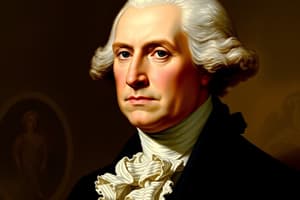Podcast
Questions and Answers
What is the author's tone in the passage?
What is the author's tone in the passage?
- Confident
- Sarcastic
- Critical
- Apologetic (correct)
Why did the author initially retire from public life?
Why did the author initially retire from public life?
- Because he felt his country no longer needed his services (correct)
- Because he was unhappy with the Constitution
- Because he wanted to focus on his religious life
- Because he was tired of the war
What was the author's concern about the Constitution?
What was the author's concern about the Constitution?
- That it might limit individual freedom
- That it might give too much power to the government
- That it might not be effective
- That it might endanger religious rights (correct)
What is the author's sentiment about religious freedom?
What is the author's sentiment about religious freedom?
How does the author describe the religious society of which the recipients are members?
How does the author describe the religious society of which the recipients are members?
What is the author's purpose in writing this passage?
What is the author's purpose in writing this passage?
What does the author believe is necessary for a free and efficient government?
What does the author believe is necessary for a free and efficient government?
Why does the author believe the recipients will support the government?
Why does the author believe the recipients will support the government?
What is the author's response to the congratulation on his appointment?
What is the author's response to the congratulation on his appointment?
The author was initially opposed to the Constitution.
The author was initially opposed to the Constitution.
What was the author's intention when he retired from public life?
What was the author's intention when he retired from public life?
The author believes that every man should be protected in worshipping the Deity according to the dictates of his own ____________________.
The author believes that every man should be protected in worshipping the Deity according to the dictates of his own ____________________.
Match the following phrases with their corresponding meanings:
Match the following phrases with their corresponding meanings:
The author believes that the general government might endanger the liberty of conscience.
The author believes that the general government might endanger the liberty of conscience.
Why did the author deviate from his initial plan of retirement?
Why did the author deviate from his initial plan of retirement?
What is the author's opinion about the religious society of which the recipients are members?
What is the author's opinion about the religious society of which the recipients are members?
To whom is the letter addressed?
To whom is the letter addressed?
The author believes that religion is a matter that lies solely between a person and the government.
The author believes that religion is a matter that lies solely between a person and the government.
What does the author believe the legitimate powers of government reach?
What does the author believe the legitimate powers of government reach?
The author believes that the nation's supreme will is expressed in the act that declared their legislature should 'make no law respecting an establishment of _______________, or prohibiting the free exercise thereof.'
The author believes that the nation's supreme will is expressed in the act that declared their legislature should 'make no law respecting an establishment of _______________, or prohibiting the free exercise thereof.'
What is the date of the letter?
What is the date of the letter?
What is the author's response to the committee's kind prayers?
What is the author's response to the committee's kind prayers?
Match the following phrases with their corresponding authors:
Match the following phrases with their corresponding authors:
Flashcards are hidden until you start studying
Study Notes
Washington's Response to Congratulation
- Washington acknowledges the gentlemen's congratulations on his appointment as the first office in the nation
- He expresses gratitude for their kind words about his past conduct
His Decision to Engage in Public Life
- Washington initially retired from public life after the war, believing his country no longer needed his services
- However, he felt a duty to re-engage in public affairs when his country needed him again
The Constitution and Religious Rights
- Washington would not have signed the Constitution if he thought it could endanger religious rights
- He is committed to ensuring the liberty of conscience and protecting against religious persecution
- He believes every man should be protected in worshipping according to his own conscience, as long as he is a good citizen
The Religious Society
- Washington recalls the religious society's consistent support for civil liberty and the American Revolution
- He believes they will continue to support a free and efficient general government
Washington's Commitment
- Washington assures the gentlemen of his best wishes and endeavors to advance their prosperity
- He appreciates their prayers for his temporal and eternal happiness
Washington's Response to Congratulation
- Washington acknowledges the gentlemen's congratulations on his appointment as the first office in the nation
- He expresses gratitude for their kind words about his past conduct
His Decision to Engage in Public Life
- Washington initially retired from public life after the war, believing his country no longer needed his services
- However, he felt a duty to re-engage in public affairs when his country needed him again
The Constitution and Religious Rights
- Washington would not have signed the Constitution if he thought it could endanger religious rights
- He is committed to ensuring the liberty of conscience and protecting against religious persecution
- He believes every man should be protected in worshipping according to his own conscience, as long as he is a good citizen
The Religious Society
- Washington recalls the religious society's consistent support for civil liberty and the American Revolution
- He believes they will continue to support a free and efficient general government
Washington's Commitment
- Washington assures the gentlemen of his best wishes and endeavors to advance their prosperity
- He appreciates their prayers for his temporal and eternal happiness
Letter to the Danbury Baptist Association
- The letter is written by Thomas Jefferson, addressed to Nehemiah Dodge, Ephraim Robbins, and Stephen S. Nelson, a committee of the Danbury Baptist association in Connecticut.
- The letter is dated January 1, 1802.
Separation of Church and State
- Jefferson believes that religion is a matter between an individual and their God, and that individuals do not owe an account to anyone else for their faith or worship.
- He thinks that the government's legitimate powers extend only to actions, not opinions.
- Jefferson references the act of the American people that declared the legislature should not make laws respecting an establishment of religion or prohibiting the free exercise of religion, thus building a wall of separation between Church and State.
Government and Individual Rights
- Jefferson believes that individuals have no natural rights that oppose their social duties.
- He is convinced that the progress of sentiments towards restoring natural rights to individuals will bring sincere satisfaction.
Personal Sentiments
- Jefferson reciprocates the kind prayers of the Danbury Baptist association for the protection and blessing of the common father and creator of man.
- He tenders high respect and esteem to the association and its members.
Studying That Suits You
Use AI to generate personalized quizzes and flashcards to suit your learning preferences.


